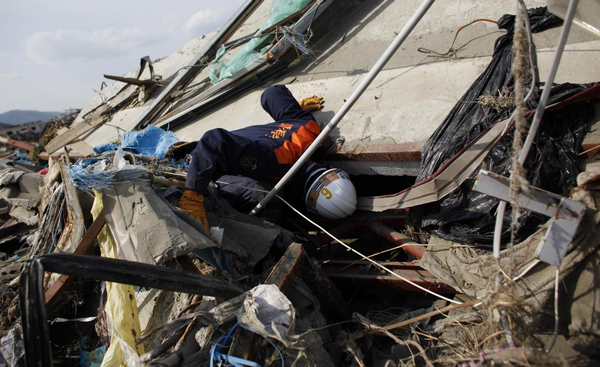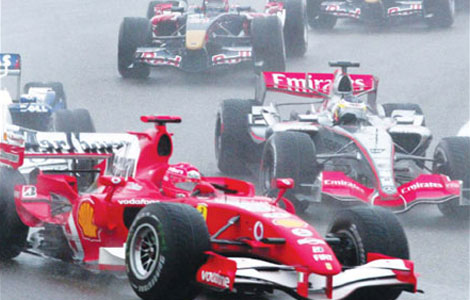Asia
Japan races to find tsunami dead despite radiation
Updated: 2011-04-07 17:12
(Agencies)
|
 A policeman searches for victims at an area that was damaged by the March 11 earthquake and tsunami, in Rikuzentakata, Iwate prefecture, April 7, 2011.[Photo/Agencies] |
MINAMI SOMA, Japan - Japanese police raced Thursday to find thousands of missing bodies before they decompose along a stretch of tsunami-pummeled coast that has been largely off-limits because of a radiation-leaking nuclear plant.
Nearly a month after a 9.0-magnitude earthquake generated the tsunami along Japan's northeastern coast, more than 14,700 people are still missing. Many of those may have been washed out to sea and will never be found.
In the days just after the March 11 disaster, searchers gingerly picked through mountains of tangled debris, hoping to find survivors. Heavier machinery has since been called in, but unpredictable tides of radiation from the Fukushima Dai-ichi nuclear complex have slowed progress and often forced authorities to abandon the search, especially within a 12-mile (20-kilometer) evacuation zone around the plant.
Officials now say there's not much time left to find and identify the dead, and are ramping up those efforts.
"We have to find bodies now as they are decomposing," said Ryoichi Tsunoda, a police spokesman in Fukushima prefecture, where the plant is located. "This is a race against time and against the threat of nuclear radiation."
Up to 25,000 people are believed to have been killed, of which 12,500 have been confirmed. There is expected to be some overlap in the dead and missing tolls because not all of the bodies have been identified.
Recent progress at the plant which the tsunami flooded appears to have slowed the release of radiation. Early Wednesday, technicians there plugged a crack that had been gushing contaminated water into the Pacific. Radiation levels in waters off the coast fell dramatically later in the day, though contaminated water continues to pool throughout the complex, often thwarting work there.
After notching that rare victory, technicians began pumping nitrogen into the chamber of reactor Thursday in order to reduce the risk of a hydrogen explosion.
Radiation in the air, soil and water in Fukushima prefecture has fallen each day since Saturday, and Tsunoda said a small team resumed the search there a day later. But the operation dramatically increased on Thursday, when 330 police and 650 soldiers fanned out, wearing white protective gear from head to toe. They are concentrating on areas between six and 12 miles (10 and 20 kilometers) from the plant - all of which are within a zone evacuated because of radiation fears.
Teams patrolled deserted streets on the fringes of Minami Soma, a city just on the edge of the no-go zone that was flattened in the crush of water. Packs of dogs caked with mud and the searchers were the only beings roaming the emptied streets.
One area inside the evacuation area seemed frozen in time: Doors swung open, bicycles lined the streets, a lone taxi sat outside the local train station.
One body was pulled out of the rubble Thursday morning.
"We just got started here this morning, so we expect there will be many more," said one officer, who requested anonymity because he was not authorized to speak to the media.
More than 1,000 people are missing in the city alone.
"I believe the search will continue until they find as many of the missing as they can, but we fear many of the missing were washed out to sea or are buried under rubble," said Takamitsu Hoshi, a city official. "We haven't been able to do much searching at all because of the radiation concerns. It was simply too dangerous."
Last weekend, US and Japanese troops conducted a massive, all-out search of coastal waters, finding about 70 bodies over three days. While such operations haven't stopped completely, they'll be severely limited going forward. The death toll for the 2004 Asian tsunami includes tens of thousands of bodies that were never found, likely sucked out to sea.
Meanwhile, the US State Department confirmed the death of Montgomery Dickson _ the second American confirmed killed in the disaster. It gave no other details.
While some progress has been made at the nuclear complex in recent days, the confidential assessment from the U.S. regulator _ obtained Wednesday by The Associated Press _ noted that plant operator Tokyo Electric Power Co. still faces several challenges. It said that salt from seawater that had been used as a coolant in the early days of the crisis is probably blocking circulation pathways, making it harder to stabilize overheating fuel.
The document,prepared by the US agency's Reactor Safety Team, which is helping the Japanese government and TEPCO _ offers new details on the conditions of the damaged cores in the three troubled reactors. For instance, it warned that the weight of water pumped into the reactors could make their vessels more vulnerable to rupture in an aftershock from the earthquake.
E-paper

Green light
F1 sponsors expect lucrative returns from Shanghai pit stop
Buying into the romance
Born to fly
Light of hope
Specials

Share your China stories!
Foreign readers are invited to share your China stories.

No more Mr. Bad Guy
Italian actor plans to smash ‘foreign devil’ myth and become the first white kungfu star made in China.

Art auctions
China accounted for 33% of global fine art sales.




